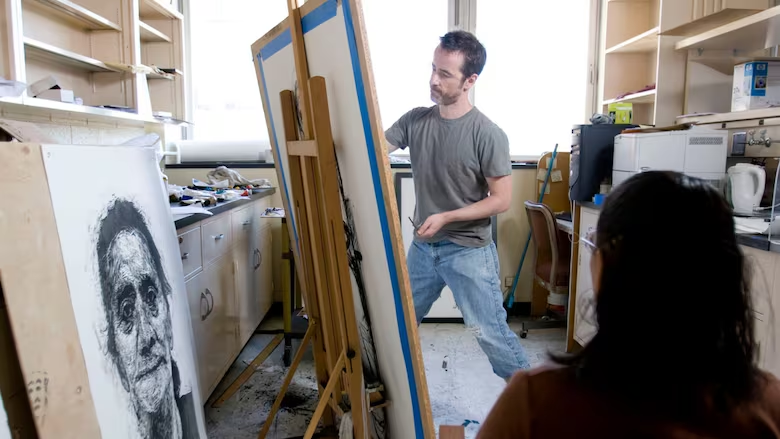How art is helping doctors and caregivers better understand dementia patients
Mark Gilbert, a researcher and artist, is creating portraits of patients at Halifax's memory clinic

An artist and researcher in Dalhousie University's faculty of medicine is painting portraits of people with dementia to better understand what they, and those who care for them, go through.
Mark Gilbert has spent the last two decades sitting across from patients and, with their consent, turning their stories into works of art.
Now, he's partnering with Dr. Kenneth Rockwood, a geriatrician and Dalhousie professor who runs the memory clinic at Halifax's QEII Health Sciences Centre.
"We're looking at how the portraits might affect them, how the portraits might communicate to others and really sort of trying to focus on more of the positive aspects," said Gilbert, who's speaking at two Alzheimer Society of Nova Scotia events this week.

Gilbert said there's a rigorous consent process, and he's not asking anybody to remember or answer questions.
"And it's up to me to be able to be open minded enough and listening enough to whatever they say to allow them to guide the marks that I'm making on the page," he said.
The partnership between Gilbert and Rockwood comes on the heels of the memory clinic's long-running artist-in-residence program. Rockwood said he's seen firsthand the power that art can have for patients, but this will be the first time caregivers will be involved.
"Done properly, art can help patients and can help even the caregivers, including the formal caregivers, the health-care professionals, to do a better job of caring, to better understand the patient perspective," he said.

Because Alzheimer's is not well understood, artists can be "independent, second eyes," and see things that doctors may have missed, said Rockwood.
Gilbert, who studied art in Glasgow, Scotland, was first approached to paint patients with facial cancer nearly 20 years ago. He said he's continually amazed at how willing people are to take part.
They're able to "use the paintings as a way of being able to engage others into conversations otherwise wouldn't have happened," he said.
Gilbert knows how difficult having those conversations can be.
His mom died about a year-and-a-half ago after a battle with Alzheimer's. Her final days were recorded in a series of intimate and emotional drawings by Gilbert's dad, Norman Gilbert, also a well-known artist.
At first, Gilbert said he couldn't bring himself to look at the drawings, but they became a necessary part of his healing.
"I'm incredibly grateful that I've got that," he said. "By engaging with it in such a rich and such an authentic and purposeful way, I think went a long way to help me come to terms and continue to come to terms with what happened."

Gilbert said the partnership with Halifax's memory clinic is still in its early stages, but eventually his work will hang together and be available for the public to view.
"These portraits will live hopefully way beyond any of us, and so there is that potential that pictures continue to communicate to future audiences, allowing them to reflect on their own experiences and gain access into the experiences of others," he said.
With files from CBC's Information Morning